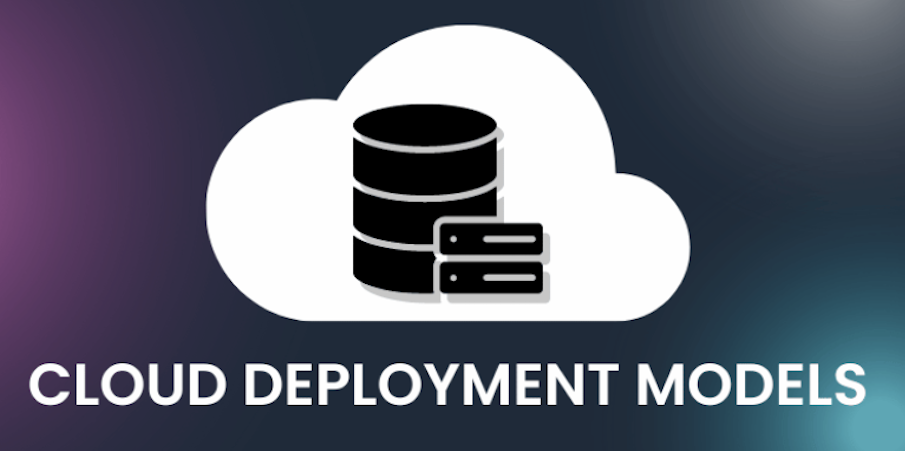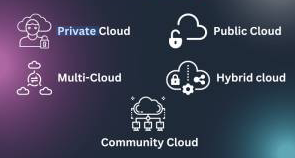Best Cloud Deployment Models and its Definition
What is Cloud Deployment Model? In simple terms, “Cloud” indicates the internet, and ‘computing’ includes the systems and infrastructure that allow computers to run, build, deploy, or interact with the information. Instead of hosting systems, infrastructure, applications on your...

What is Cloud Deployment Model?
In simple terms, “Cloud” indicates the internet, and ‘computing’ includes the systems and infrastructure that allow computers to run, build, deploy, or interact with the information.
Instead of hosting systems, infrastructure, applications on your hard drive, or a site server, you can host on virtual or online servers that connect your computer directly through fully secured networks.
 Choose the best cloud deployment models for your Business
Choose the best cloud deployment models for your BusinessAmazon Web Services (AWS) offers a variety of cloud deployment models to meet the needs of different organizations. Before choosing the suitable cloud deployment model for your Business, you must understand all deployment models.
Public Cloud
The third-party provider makes various resources and services available in the public Cloud. The provider manages and maintains the infrastructure and resources for users on demand.
Users access the resources and services through a web-based interface or API and typically pay for only the resources and services they use on a pay-as-you-go basis. Businesses can utilize the public Cloud for tasks that require a large scale of computing resources or need to be scaled up or down quickly and easily.
They offer several benefits, including cost savings, flexibility, and scalability. Similarly, they also come with risks and challenges, such as security and compliance concerns.
Benefits of Public Cloud
Cost Savings: Public clouds are based upon a pay-as-you-go pricing model so that users only pay for the resources and services they consume.
Flexibility: This allows organizations to easily adjust their Cloud computing resources to meet changing demands (scaled up and down) without investing in additional hardware or software.
Scalability: Public clouds offer a vast pool of resources that organizations can access on demand, allowing them to quickly and easily scale their business operations faster than other cloud deployment models.
Reliability: Public cloud providers typically have robust infrastructure and disaster recovery processes to ensure their services’ availability.
Innovation: Public cloud providers are constantly updating and adding new features and services to their platforms, which can help organizations stay on the cutting edge of technology and innovation.
Public Cloud is best for what types of Business?
Public clouds are well-suited for a wide range of business use cases, including:
Web and mobile applications: Organizations use public clouds to host and run web and mobile applications. They provide the scalability and flexibility needed to support large numbers of users and handle sudden spikes in traffic. Data analytics: Public clouds offer a range of tools and services for storing, processing, and analyzing large volumes of data, making them well-suited for data-intensive tasks, such as big data analytics and machine learning. Software as a Service (SaaS): Many organizations use public clouds to deliver software applications, allowing them to quickly scale their operations to meet changing demand and reduce the cost of managing and maintaining on-premises infrastructure. Disaster recovery: Public clouds can be used as part of an organization’s disaster recovery strategy. They can quickly spin up resources and applications in an outage or disaster. Testing and development: Public clouds can be used for testing and development purposes. They provide access to a wide range of resources and tools. Those tools can be used to build and test applications and services.Organizations that need to scale their operations quickly and easily find private clouds to be a good fit. They are also well-suited for organizations that want to take advantage of the latest technology and innovation without investing in their infrastructure.
Private Cloud
It’s a cloud computing deployment model in which the infrastructure and resources are owned and managed by a particular organization and are not made available to the public.
The organizations have complete control over the infrastructure and resources and can customize them according to their business needs.
Private clouds are used by those organizations that want strict security and compliance requirements.
Benefits of Private Cloud deployment model
Security: Private clouds provide a higher-level of protection than any other cloud deployment model.
Control: Organizations have complete control over their infrastructure and resources, including their ability to customize them to meet their specific needs.
Compliance: organizations meet regulatory and compliance requirements, as they can configure the infrastructure and resources to meet specific needs.
Performance: Private clouds dedicate resources to single organizations and do not share them with users, resulting in improved performance.
Scalability: Like public clouds, Private clouds can scale up or down to meet changing needs.
Private Cloud is best for what types of Business?
Private clouds are well-suited for a wide range of business use cases, including:
Organizations with strict security and compliance requirements. Large enterprises: Good fit for large enterprises with a large and stable computing workload and want to ensure a high level of control over their computing environment. Organizations with on-premises data centers: Organizations with a significant investment in their infrastructure can deploy private clouds in their own data center, making them a good fit. Organizations with specific hardware or software requirements: Organizations with strict security and compliance requirements or a need for a high level of control over their computing environment generally find private clouds to be a good fit.Additionally, organizations with large and stable computing needs and willing to invest in and maintain their infrastructure also benefit from using private clouds.
Hybrid Cloud
Hybrid clouds combine public and private clouds and allow organizations to use both types of clouds to meet their different needs.
It enables organizations to leverage the public Cloud for tasks that demand a significant number of computing resources or need to scale up or down quickly and simultaneously use the private Cloud for functions that necessitate a higher level of security and control.
However, they also come with challenges, such as managing and maintaining multiple cloud environments and integrating the public and private clouds.
Benefits of Hybrid Cloud
Scalability: Easy to scale your resources and services per your business requirements.
Cost savings: Organizations can take advantage of the cost savings offered by the public Cloud while still using the private Cloud for tasks that require higher security.
Flexibility: Hybrid clouds offer a high level of flexibility, allowing organizations to choose the best Cloud for each task or workload.
Security: As this type of Cloud deployment combines private Cloud, it also provides a higher level of protection.
Integration: Integrate their on-premises infrastructure and applications with the public Cloud, which can help to streamline processes and improve efficiency.
Hybrid Cloud is best for what types of Business?
Hybrid clouds are best for a wide range of business use cases, including:
Organizations with a mix of computing needs: Hybrid clouds meet the needs of organizations with a combination of tasks that require a large number of computing resources or need to be scaled up or down quickly and functions that require a higher level of security and control. Organizations with on-premises infrastructure and applications: Hybrid clouds allow organizations to integrate their on-premises infrastructure and applications with the public Cloud. That can help to streamline processes and improve efficiency. Organizations with fluctuating computing needs: Hybrid clouds allow organizations to scale their resources and services quickly and easily, making them well-suited for organizations that experience sudden spikes in demand or fluctuating computing needs. Organizations with strict security and compliance requirements: Hybrid clouds offer a higher level of security than public clouds. Tasks requiring higher protection and control can be accomplished by utilizing the private Cloud. Organizations that want to take advantage of the latest technology and innovation: Hybrid clouds allow organizations to take advantage of the newest technology and innovation. Organizations can access a vast pool of resources on demand, making it easy to scale business operations quickly and faster than other cloud deployment models while maintaining a high level of control over their infrastructure and resources.Organizations with fluctuating computing needs or strict security and compliance requirements find public clouds well-suited for their needs.
Community Cloud
It is a deployment model in which organizations with shared interests come together to use a shared infrastructure and resources.
A third-party provider or one or more participating organizations own and manage the infrastructure and resources in a multi-cloud environment, delivering the community’s specific needs.
Benefits of Community Cloud
Cost savings: Surprisingly, community clouds share the cost of infrastructure and resources to be more cost-effective.
Scalability: Allows organizations to scale resources and services quickly and easily per their requirements.
Flexibility: High level of flexibility to meet business needs and requirements.
Shared expertise and resources: Share resources and expertise with other organizations, which can help to reduce costs and improve efficiency.
Community Cloud is best for what types of Business?
Community clouds are best for a wide range of business use cases, including:
Organizations shared interests or challenges. Government agencies. Healthcare Organizations. Educational Institute. Non-profit Organizations.Organizations with shared interests or challenges can benefit from using public clouds. Organizations want to use Cloud’s cost savings and scalability while maintaining control over their infrastructure and resources.
Furthermore, organizations can use multi-cloud environments to meet specific compliance and security requirements.
Multi-Cloud
Organizations can use multiple cloud computing platforms from different providers to meet their requirements.
Importantly, Deploy multi-cloud environments in various ways, such as using a combination of public, private, and hybrid clouds or a combination of on-premises and cloud-based infrastructure.
Multi-clouds offer to tailor infrastructure and resources to specific needs and choose the best provider for each task or workload.
Benefits of Multi-Cloud Deployment Model
Scalability. Flexibility. Cost Savings. Performance boosting. Improved resilience.Multi-Cloud is Best for what types of Business?
Organizations with a variety of computing needs. Organizations that want to take advantage of the strengths and capabilities of different providers. Organizations that want to reduce the risk of an outage or disaster affecting all of the computing requirements. Organizations with fluctuating computing needs. Organizations with strict security and compliance requirements.Organizations generally use multi-cloud deployment models, which are best for organizations with significant computing needs and cost savings.
The best cloud deployment model for those organizations that want to take advantage of the strengths and capabilities.
Which is the most common cloud deployment model?
The most common cloud deployment model is the public Cloud. A third-party provider owns and operates public clouds to deliver various services. Computing, storage, and networking over the internet are the best examples.
Furthermore, they offer several benefits, including scalability, flexibility, and cost savings. Organizations only pay for the resources and services they use.
Regarding the cloud deployment model, you can choose the best deployment model among many deployment models.
Which cloud deployment model is best for the bank?
However, it depends on the use cases and requirements of the bank. Private clouds, with their high security and complete control access, are best for banks and financial institutions.
BFIs(Banks and other financial institutions) have strict security and compliance. Moreover, Online stores can utilize public clouds for their scalability and cost-effectiveness while protecting sensitive customer data. The Private Cloud helps to fulfill all these requirements.
The best cloud deployment model for an Online Store.
An online store’s specific needs and requirements will determine the most suitable cloud deployment model. Online stores can use public clouds for their scalability and cost-effectiveness.
In other words, A hybrid cloud is also the best deployment model for an Online Store. Additionally, this model combines both a public and private Cloud, allowing for the flexibility and scalability of a public cloud. Additionally, it maintains the security and control of a private cloud. Store sensitive customer data on a private cloud and non-sensitive data on a public cloud for cost efficiency.
Featured Image Credit: Provided by the Author; Thank you!
Prabin Singh Thakuri
Prabin Singh Thakuri is tech-enthusiastic and energetic, always striving to achieve the highest standard possible at any given task with good communication skills. Prabin Thakuri says, 'My life goals for work are to be more creative, knowledgeable, and always interested in various fields such as technology, Machine learning, Celebrities, players, news, gossip, and so on." He currently works for Adex.ltd.

 Konoly
Konoly 
































